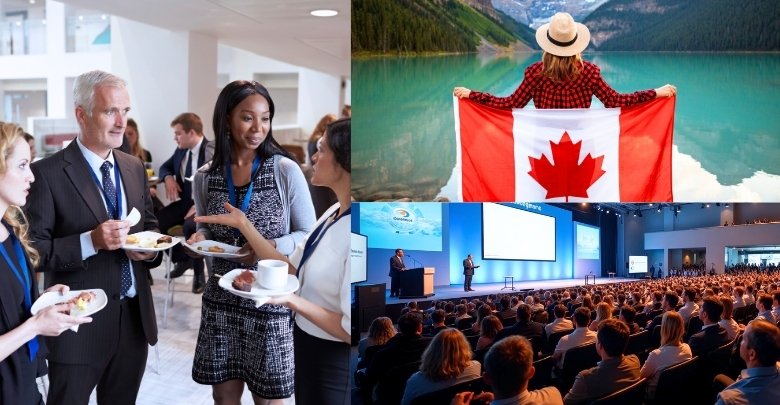Attending conferences can be a pivotal opportunity for professionals and academics to network, exchange ideas, and enhance their expertise. For international attendees, obtaining a visa is a key step in making this experience possible. Now, you may be thinking about: What is the benefit of conference visa in Canada?
Conference visa in Canada opens doors to professional networking, offering connections with industry leaders and peers. It encourages knowledge enhancement, providing access to the latest trends and valuable resources. You’ll develop new skills, broaden your career prospects, and have the flexibility to explore the country’s richness.
It’s not just about professional growth—there’s personal enrichment too. Ready to dive deeper? Let’s continue exploring.
What Are the Required Documents for the Canadian Conference Visa Application?
Preparing for a Canadian conference visa? Having the right documents is key to ensuring a hassle-free application process. To make things simple, here’s a clear breakdown of what you’ll need:
- Valid Passport: Ensure your passport has at least six months’ validity after your planned return date. Double-check for blank pages for visa stamps.
- Completed Visa Application Form: Submit the official TRV form with accurate details. A small mistake could lead to unnecessary delays.
- Proof of Conference Registration: A registration receipt confirms your purpose for visiting Canada. It shows you’re a legitimate participant in the event.
- Invitation Letter: Request an official invitation letter from the conference organizers. This adds credibility to your application.
- Proof of Financial Support: Provide recent bank statements or sponsorship letters. This assures you can cover your travel, stay, and other expenses.
- Travel Itinerary: Include flight details and accommodation bookings to outline your schedule. It’s proof you have a clear plan for your visit.
- Employment Verification: Submit a letter from your employer confirming your job role and leave approval. This proves you plan to return home.
- Proof of Ties to Home Country: Documents like family records, job commitments, or property ownership show strong ties to your home country.
- Passport-Sized Photos: Photos must meet Canada’s visa specifications, so check size, clarity, and background guidelines to avoid rejections.
- Previous Travel History: If you’ve traveled internationally before, include visas or stamps. This reflects travel reliability and helps your case.
Who Needs to Apply for a Conference Visa in Canada?
Travel arrangements to Canada should be made after finding out who needs a conference visa. This visa ensures smooth entry for individuals attending professional, academic, or industry-related events. Here are some of the key groups that require Canadian conference visas.

International Professionals and Business Representatives
Professionals attending conferences for business growth, networking, or skill development must secure a visa. It allows them to represent their organization on a global platform. With proper documentation, they can share knowledge and build international partnerships. Attending such events boosts careers while showcasing their expertise.
Academic Scholars and Researchers
Academics participating in seminars, conferences, or workshops to present research or collaborate with peers need this visa. Their role is vital for sharing innovative ideas and findings. Conferences enable them to connect with global experts in their field. These events also strengthen their academic reputation and career prospects.
Students Attending Educational Conferences
Students participating in educational events or competitions as delegates must apply for a conference visa. Such events are opportunities to learn and grow academically. By joining, students can network with experts and gain new perspectives. It’s a chance to develop skills that go beyond classrooms.
Speakers and Presenters
Individuals invited to speak or present at Canadian conferences require a conference visa. This validates their purpose and role at the event. Presenters often bring unique insights or groundbreaking knowledge to international audiences. Their participation enhances the event’s value and promotes cross-border knowledge sharing.
Exhibitors and Industry Participants
Companies showcasing products or innovations at conferences or trade events need to apply for this visa. Exhibitors use these platforms to connect with potential clients and partners. It’s a chance to highlight their offerings on an international stage. Securing the visa ensures they can attend without hassle.
Attendees Seeking Professional Growth
Individuals looking to attend conferences purely for learning and networking opportunities need a conference visa. These events expose them to trends, skills, and valuable resources. Attendees often gain insights to advance their careers and broaden their horizons. It’s an investment in professional and personal development.
How to Apply for a Conference Visa in Canada?
Applying for a conference visa to Canada may seem overwhelming, but a well-structured approach simplifies the process. With proper preparation, you can complete each step efficiently and avoid delays. Here’s a clear step-by-step guide to help you navigate through the application process smoothly.
Step 1: Get to Know the Visa Requirements
Start by reviewing the specific requirements for a Canadian conference visa on the official immigration website. The list typically includes a valid passport, proof of conference registration, financial documents, and an invitation letter. Having all the details upfront ensures you know what to gather. You will be less likely to miss important documents if you understand these essentials.
Step 2: Gather the Necessary Documents
Organize all required documents, including your completed visa application form and a letter from the conference organizers. Bank statements, employment verification, and your travel itinerary add strong support to your application. When attending events like HR seminars, following the steps to get a visa for HR conferences in Canada ensures you cover everything comprehensively. Properly organized documents make the entire submission process much smoother.
Step 3: Complete the Visa Application Form
Carefully fill out the Temporary Resident Visa (TRV) application form with accurate and up-to-date information. Errors in the form can delay or even jeopardize your visa approval. Take your time to review all details before submission. It’s a good idea to use the guide provided on the Canadian immigration website for accuracy.
Step 4: Pay the Visa Fees
After completing the form, proceed to pay the visa processing fee through the designated payment method. Save a copy of your payment receipt for submission with your application. The fee confirms your commitment to the process and allows the authorities to begin reviewing your case. Always double-check fee requirements to avoid unnecessary mistakes.
Step 5: Submit Your Application
You can submit your visa application online or through a visa application center (VAC), depending on your preference. If submitting online, ensure all documents are uploaded clearly in the required format. For physical submissions, arrange your papers neatly to avoid confusion. After submission, you’ll receive a confirmation and tracking details for your application status.
Step 6: Attend a Biometrics Appointment (If Required)
In some cases, you’ll need to schedule and attend a biometrics appointment as part of the visa process. The appointment involves submitting your fingerprints and photographs at a designated location. Taking this step ensures the security of your application and verifies your identity. Make sure to complete this promptly to avoid delays.
Step 7: Wait for the Visa Decision
Once your application is submitted, the processing time begins, and you need to wait for the decision. This can vary depending on your location and application complexity. Regularly track your application status online for any updates. A clear and complete submission increases your chances of faster approval.
Step 8: Prepare for Your Trip
After receiving your visa, review all the details to ensure accuracy before booking your flights. Plan your itinerary, confirm accommodation, and gather any additional conference documents you might need. Preparation ensures a smooth arrival in Canada without unnecessary stress. Keep your passport and visa safely accessible while traveling.
What is the Benefit of Conference Visa in Canada?
With a Canadian conference visa (Temporary Resident Visa or TRV), you can expand your professional network, gain international exposure, and enrich your personal life. It’s more than just a travel document—it’s a doorway to opportunities you can’t afford to miss. Here are a few reasons why obtaining a Canadian conference visa is worthwhile.

Expand Your Professional Network
Conferences bring together professionals, experts, and peers, giving you a chance to grow your network. Meeting influential individuals in your field can lead to unexpected collaborations, job offers, or innovative projects. Every handshake and conversation helps you build lasting professional relationships that matter. Connections formed at such events often open doors to new career opportunities.
Networking isn’t just about business—it’s about sharing ideas and inspiring each other. Discussing trends with professionals from different countries exposes you to diverse viewpoints. The more people you connect with, the better positioned you are in your industry for the future.
Gain Knowledge and Sharpen Your Skills
Participating in workshops, seminars, and keynote sessions allows you to upgrade your knowledge and skills. You get direct access to experts sharing the latest research and real-world solutions. This learning experience is practical and specifically designed to address emerging industry challenges.
It’s easy to fall behind if you’re unaware of the latest trends or innovations. Conferences in Canada ensure you stay informed, helping you remain relevant and competitive. Knowledge gained at such events can significantly impact your work, inspiring new approaches and ideas.
Experience International Exposure
One major advantage of the conference visa is the opportunity to engage with global audiences. Sharing perspectives with professionals from various backgrounds helps you adopt new strategies and techniques. It enhances your knowledge of global practices and broadens your outlook.
While gaining professional insights, you’ll also experience Canada’s vibrant culture. Whether through exploring cities or interacting with locals, cultural exchange becomes an enriching part of your journey. Such exposure can inspire fresh ways of thinking and advance your professional approach.
Enhance Your Professional Development
Adding the experience of attending an international conference to your resume speaks volumes about your dedication to professional growth. Employers value candidates who seek opportunities to improve their skills and expand their knowledge. This kind of credential can make you stand out in the job market.
If you present your work or research at a conference, it’s a chance to showcase your expertise. Receiving recognition on an international stage increases your credibility and visibility. Your reputation grows, and so does your confidence in your professional abilities.
Access to Innovative Resources
Conferences often feature exhibitions, trade shows, and demonstrations showcasing the latest products and technologies. These events provide direct access to tools and resources that can transform how you work. You might discover solutions to challenges that have been holding you back.
You’ll also receive valuable materials, publications, and research papers from the event. These resources become assets you can refer to later. Bringing such knowledge back to your workplace allows you to add value and share insights with your team.
Build Personal Confidence and Grow
Attending an international conference builds more than your skills; it strengthens your confidence. Presenting your ideas or speaking to a global audience hones your public speaking and communication abilities. Over time, this personal growth translates into stronger professional performance.
Exposing yourself to innovative ideas inspires creativity and enthusiasm. You leave with a fresh mindset and renewed motivation to pursue goals. Personal growth through these experiences shapes you into a more confident and resourceful professional.
Explore Canada with Visa Flexibility
The Canadian conference visa doesn’t limit you to work—it gives you the freedom to explore. After attending your event, you can travel around and experience Canada’s iconic landscapes, attractions, and cities. It’s an excellent way to combine professional growth with personal enjoyment.
Taking time to relax and recharge in a new environment can inspire fresh ideas. The conference visa ensures you maximize both your time in Canada and the overall experience. Balancing exploration and work makes the trip even more fulfilling.
How to Utilize the Conference Visa in Canada?
The Canadian conference visa provides opportunities for growth, learning, and exploration. Make the most of your visit by planning smartly and making the most of your time. Here are some practical tips to help you fully utilize your conference visa in Canada.

- Plan Your Schedule: Review the conference agenda and mark key sessions or workshops. Prioritize events that align with your goals to maximize your time.
- Engage Actively with Attendees: Introduce yourself to speakers, experts, and fellow participants during breaks or networking sessions. Meaningful conversations often lead to valuable connections and opportunities.
- Attend Workshops and Seminars: Participate in interactive sessions to gain hands-on knowledge and skills. These activities provide new insights that can enhance your professional expertise.
- Explore the Conference Exhibitions: Visit trade booths showcasing products, technologies, and resources. Exhibitions often feature innovations that could inspire solutions to your work challenges.
- Take Notes and Collect Resources: Write down important points during key sessions or presentations. Gather materials, research papers, or brochures for reference after returning home.
- Balance Work and Exploration: While entering Canada on a conference visa, set aside time to explore nearby cities or cultural landmarks. Combining learning with travel makes the experience more rewarding.
- Follow Up with New Contacts: Exchange business cards or connect on LinkedIn with people you meet. Following up ensures these relationships continue to grow after the event.
- Present Your Work Confidently: If presenting at the conference, prepare thoroughly to showcase your ideas effectively. Confidence and clarity leave a lasting impression on attendees.
- Network Beyond Conference Hours: Take advantage of informal activities or social events associated with the conference. Conversations outside of sessions often lead to deeper, meaningful connections.
- Share Insights Upon Returning: Once home, share your learnings and materials with colleagues or teams. This positions you as someone who brings value to others.
FAQs About Canadian Conference Visas
A conference visa for Canada offers numerous advantages, but you might still have questions about its broader impact. Below are five frequently asked questions (FAQs) that clarify how this visa benefits attendees professionally and personally.
Can a Conference Visa Help Advance My Career?
Absolutely! Attending conferences allows you to acquire new skills, stay updated with industry trends, and boost your professional credibility. Presenting your work or networking with experts enhances your reputation and opens doors to collaborations or job opportunities.
Does the Visa Allow Me to Access Exclusive Events?
Yes, a conference visa grants access to workshops, seminars, and exhibitions, often restricted to registered participants. These events showcase the latest technologies, research, and resources, helping you gain insights and discover innovative solutions for your personal or professional projects.
Will I Be Able to Experience Canadian Culture During My Trip?
Certainly! While your primary purpose is attending the conference, the visa provides flexibility to explore Canada’s attractions. Experiencing its diverse culture, landmarks, and cities enriches your visit, blending professional learning with personal growth and inspiration.
How Does a Conference Visa Support My Networking Goals?
The visa enables you to attend events where professionals, experts, and industry leaders gather. Engaging in conversations and exchanging ideas at these conferences helps you build lasting connections that can lead to partnerships, mentorships, or future career advancements.
Is the Knowledge Gained at Conferences Practical for My Field?
Yes, the workshops and discussions offer practical solutions and new perspectives you can apply directly to your work. From innovative tools to real-world insights, the knowledge you gain is highly relevant and helps improve your professional output and productivity.
Wrap Up
Securing a conference visa for Canada opens doors to numerous opportunities for growth, learning, and exploration. It allows you to engage with professionals, gain global exposure, and access valuable resources that enhance your career and personal development.
If you’re wondering what is the benefit of conference visa in Canada? It’s about expanding your network, gaining advanced knowledge, and experiencing the country’s vibrant culture.
This visa ensures you make the most of your journey, balancing professional enrichment with personal fulfilment. With proper planning and active participation, attending conferences in Canada becomes a life-changing experience that fuels long-term success.
